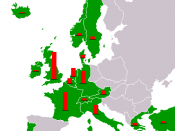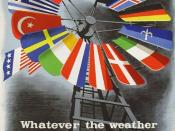"I need not tell you gentlemen that the world situation is very serious. That must be apparent to all intelligent people. I think one difficulty is that the problem is one of such enormous complexity that the very mass of facts presented to the public by press and radio make it exceedingly difficult for the man in the street to reach a clear appraisement of the situation. Furthermore, the people of this country are distant from the troubled areas of the earth and it is hard for them to comprehend the plight and consequent reaction of the long-suffering peoples, and the effect of those reactions on their governments in connection with our efforts to promote peace in the world.
This is the first paragraph of a very famous speech:
On June 5, 1947, Secretary of State George C. Marshall spoke at Harvard University and outlined what would become known as the Marshall Plan.
Europe, still devastated by the war, had just survived one of the worst winters on record. The nations of Europe had nothing to sell for hard currency, and the democratic socialist governments in most countries were unwilling to adopt the draconian proposals for recovery advocated by old-line classical economists. Something had to be done, both for humanitarian reasons and also to stop the potential spread of communism westward
The United States offered up to $20 billion for relief, but only if the European nations could get together and draw up a rational plan on how they would use the aid. For the first time, they would have to act as a single economic unit; they would have to cooperate with each other. Ireland though not as obviously affected by the war as other European states would also receive aid.
The Marshall Plan was essentially needed to avert...


![[St. Stephen's Green Park, Dublin. County Dublin, Ireland] (LOC)](https://s.writework.com/uploads/1/13399/st-stephen-s-green-park-dublin-county-dublin-ireland-loc-thumb.jpg)